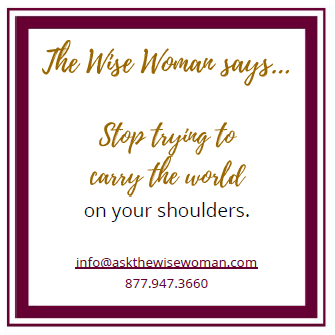Learning to Balance Responsibility and Love
- Brainz Magazine

- Aug 13, 2025
- 4 min read
As a Life Mastery Certified Coach®, Susan integrates spirituality with practicality, guiding women to discover their unique Soul Goal™ and chart a personal path to success and happiness. Unlock your inner wisdom, align your heart with your mind, and uncover actionable steps that resonate with your authentic self.

Every time I go for a massage, the routine starts the same way: the therapist asks, “Are there any areas of concern?” Without fail, my answer is always some version of, “The tightness in my shoulders.” This inevitably leads to a knowing smile and the classic response, “Ah, yes. You’re one of those who carries the weight of the world on your shoulders!”

And they’re right, I do feel that way sometimes. Growing up, I was taught the importance of being a “responsible adult,” a lesson I took to heart. Over time, however, I realized there’s a fine line between being responsible for myself and feeling responsible for the people and situations I care deeply about. It’s a balancing act that’s neither simple nor straightforward, especially when your heart aches to ease someone else’s burden.
The challenge of "caring too much"
I know in my core that life has its own rhythm and flow. Everything unfolds as it’s meant to, there are lessons to be learned and experiences to be had. But knowing this doesn’t necessarily make things easier, especially when you’re witnessing someone you love stumble or struggle. The natural instinct to jump in and help often kicks in.
For example, I remember a time when a dear friend was navigating a difficult career transition. She was frustrated, overwhelmed, and, at times, completely discouraged. My first impulse? To brainstorm solutions, draft cover letters, and send her job postings. While she appreciated my efforts, I could tell it wasn’t what she really needed. What she truly needed was space to process, vent, and make her own decisions.
It was a wake-up call for me: my "helping" wasn’t helpful. In fact, it might have been hindering her from fully owning her journey. Sometimes, the best way to support someone is to simply hold space for them, to listen, to empathize, and to trust that they will find their way, just as you’ve found yours.
The fine line between support and responsibility
This brings me to a hard truth I’ve had to embrace: the only person I am truly responsible for is me. That doesn’t mean I stop caring or supporting the people I love. It means recognizing where my responsibility ends and theirs begins.
Here’s an analogy that’s helped me reframe this dynamic: Imagine you’re holding a safety net for someone walking a tightrope. Your role is to ensure the net is there to catch them if they fall, but it’s their job to walk the rope. You can’t take their steps for them, no matter how much you want to.
When my teenage niece faced her first major heartbreak, I was tempted to intervene, to offer advice, distract her, or even get angry at the person who hurt her. But instead, I chose to be her safety net. I listened without judgment, gave her a shoulder to cry on, and reminded her that she was strong enough to heal in her own time. Watching her pick herself up and move forward with newfound resilience was a powerful reminder that letting someone navigate their struggles can be the most loving thing you can do.
How to lighten the load on your shoulders
If you, like me, often feel the weight of the world pressing down on your shoulders, here are a few strategies that might help:
1. Pause before you leap to help
When someone shares a challenge with you, take a moment to ask yourself: Am I stepping in because they truly need me, or because I feel uncomfortable watching them struggle? Oftentimes, our urge to help stems from our own discomfort rather than their actual need.
2. Offer support, not solutions
Instead of jumping in with advice or action plans, try asking questions like, “What do you think would help right now?” or “How can I best support you?” This approach empowers the other person to take ownership of their situation.
3. Set healthy boundaries
Being supportive doesn’t mean sacrificing your own well-being. If you find yourself drained or resentful, it’s a sign that your boundaries need adjustment. Remember, you can only pour from a full cup.
4. Trust their journey
Just as you’ve learned and grown through your own struggles, so will they. Trust in their ability to navigate their path, even if it looks different from what you would choose for them.
The wise woman says...
When I reflect on the metaphor of carrying the weight of the world on my shoulders, I’m reminded of the famous quote: “You cannot pour from an empty cup.” It’s not just a reminder to care for yourself, it’s a call to trust that the people you love are capable of carrying their own weight.
The next time you feel that familiar tightness in your shoulders, take a moment to breathe and check in with yourself. Are you carrying responsibilities that aren’t truly yours? Are you holding on to the illusion that you can fix or control things for others? If so, let it go.
Because the truth is, your greatest responsibility, and your greatest gift, is to show up as the best version of yourself. Love fiercely, support generously, and trust deeply. But remember, the only life you’re truly responsible for is your own. And that is more than enough.

Susan F. Moody Intuitive Business, Life, and Success Coach
Susan F. Moody, Wise Woman, is dedicated to empowering women to tap into their own inner wisdom and discover the power of intentional living. Along her personal journey, Susan became a wisdom seeker looking for ways to connect with the divine for inspiration and guidance. She started working with the I Ching, angel cards, wisdom cards, runes and pendulum work over 20 years ago and now offers these spiritual insight tools as an option to her clients. She has also developed a tangible technique, the Soul Goal™ finder, to help clients answer the contemplative question “Why am I here?”









